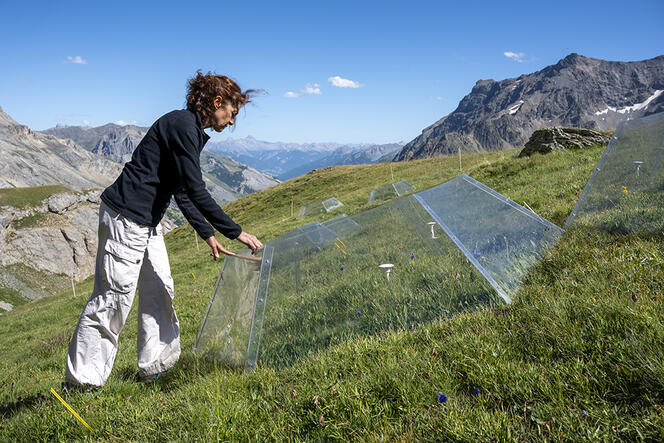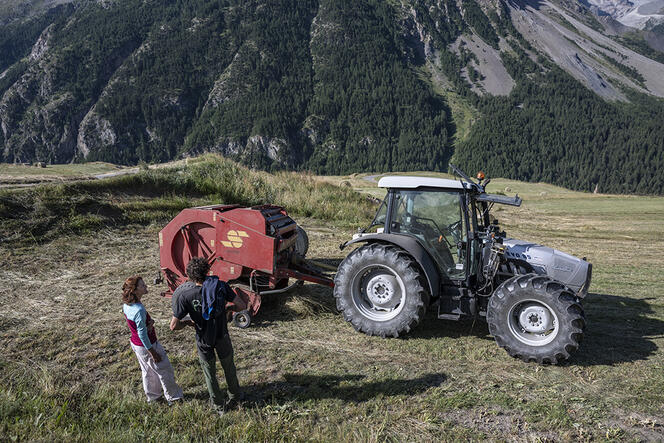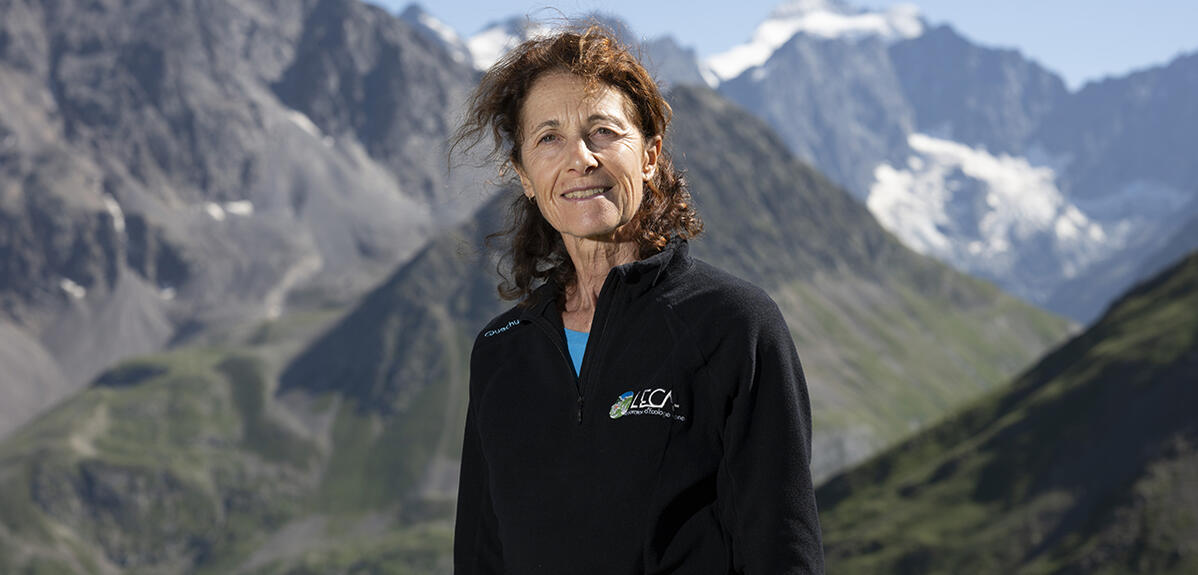Awarded for her pioneering work in functional ecology, Sandra Lavorel is the winner of the CNRS Gold Medal 2023. Her obsession: the functioning of ecosystems and the services they are likely to provide to human societies. Her favorite playground: the Alps, where she mimics the effects of global warming on high-altitude meadows.
“ We have no chance of solving the current climate crisis if we do not work closely with people. » What immediately catches the eye about Sandra Lavorel, winner of the 2023 CNRS gold medal, is her love for nature and the deep respect she has for her neighbors. She also spends a good part of her time, as a good ambassador, bringing people into dialogue with the elements. ” She is a pioneer, at least in France and Europe, of work on the interface between the natural sciences and the human and social sciences.confirms Éric Garnier, from the Center for Functional and Evolutionary Ecology (Cefe) in Montpellier, with whom she has worked in the past. She is incredibly bright. »
Director of research at the University of Grenoble-Alpes, she is a specialist in functional ecology, i.e. the functioning of ecosystems and the services they are likely to provide to human societies. ” The ecosystem can, for example, provide food, fuel, materials, but also regulate the climate by storing carbon, clean water, ensure pollination of crops, etc. explains the expert. It also offers more cultural benefits: a beautiful landscape, like a flower meadow for example, invites reflection and provides a sense of well-being. » Sandra Lavorel devotes her research specifically to the study of the impact of climate change and land use on the contributions of nature to people. Her favorite playground: the mountains, especially the Haute-Romanche valley, above Grenoble, where she mimics the effects of global warming on alpine meadows.

At the Lautaret Science Station, Sandra Lavorel mimics the effects of global warming on mountain plants thanks to these mini-greenhouses set up in meadow plots.
A pioneer of functional ecology
She started her career as an ecologist at the end of the 1980s, after graduating with honors and two years of scientific preparation, she obtained a degree in agricultural engineering. ” I am glad that I started my course with this training, which introduced me not only to ecology and biology, but also to social sciences. “, she congratulates herself. With this first hybrid background in hand, the researcher continued her journey with a doctoral dissertation in ecology and evolutionary sciences at the University of Montpellier 2. When she defended her thesis in 1991, functional ecology was just beginning to emerge as a discipline.

The revolution of functional ecology embodied by Sandra Lavorel? Classify plants not by their identity, but by their functions. This, with the aim of modeling entire ecosystems.
” During my three-year postdoctoral studies in Canberra, Australia, I had the opportunity to work with researchers who classified plants not by their identity, but by their functions. This is with the aim of modeling entire ecosystems and analyzing their response to climate change. It was the first time Sandra Lavorel recalls. And a real source of inspiration for the ecologist who has the idea, with colleagues, to apply this method of functional ecology in Europe, at the local level, in order to monitor the evolution of ecosystem functions in accordance with land use, climate change, the increase of invasive species…
The mountain as a playground
We understand why Éric Garnier says that she has ” the ability to discover and synthesize ideas, trends, disciplines, out of the ordinary “. She carried out her pioneering work on Mediterranean ecosystems in 1994 in Cefe, where, having barely returned from the end of the world, she got her first position at the CNRS. ” It was very interesting and educational, but I love mountains. I know this since I did youth internships in the Mercantour or Écrins national parks. This is my playground! » she declares, proudly pointing to the picture behind her showing the Haute-Romanche valley where many peaks are close to 4000 meters.
To determine how ecosystems and the services they provide to people evolve, we must first know them precisely. Sandra Lavorel therefore begins fine modeling of entire parts of the Alpine territory – plants, insects, animals…
” When I arrived at the Alpine Ecology Laboratory in 2003 (Leca) in Grenoble, the CNRS gave me funding to start a team and I started the topic of functional ecology », emphasizes Sandra Lavorel. To determine how ecosystems and the services they provide to people evolve, we must first know them precisely. With her colleagues, the researcher is therefore embarking on ultra-fine modeling of entire parts of the Alpine territories: ” it includes mapping different environments, listing plants, insects, animals and the services they provide to humans, measuring nutrient storage in leaves, pollination rates, etc. Then feed all this data into computer statistical modelswith “.
Once the playground is understood to the smallest detail, all that remains is to change the parameters. Understand: Accelerate climate change, better measure its impact on ecosystems and the services they provide to our communities. To do this, Sandra Lavorel implemented several innovative projects. With his colleagues from Lec, for example, he heats, dries or cleans entire plots of his beloved mountains at the Lautaret scientific station, located just below the pass made famous by the Tour de France. ” WITHAndra could be “satisfied” with being a brilliant environmentalist. But she decided to step out of her comfort zone and become interested in nature’s contributions to local societies in the Alps, stresses Isabelle Arpin, one of her close colleagues at Inrae. In particular, it has developed relationships of trust with stakeholders in the Haute-Romanche valley, and especially with agricultural stakeholders. He has been working with them for twenty years, which requires great persistence, and a lot of diplomacy and modesty. »
Reconciliation of people with the environment
People, obviously. One of Sandra Lavorel’s greatest contributions to this discipline is that she succeeded in accurately measuring the impact of land use by residents on ecosystems and the services they provide to that same community. And for this aspect of this research, she developed new methods. ” In order to determine how to use the soil while preserving ecosystem services, we include primary stakeholders, i.e. local stakeholders: farmers, but also departmental authorities, urban planning agencies, the ministry responsible for the environmentshe explains. Together with them, we regularly organize workshops where everyone expresses their constraints and wishes. Especially thanks to social games of our own design, we think together about the impact of this or that practice: what happens if we fertilize a little less, if we stop mowing, if we plant trees, if we practice extensive rather than intensive agriculture… These regular exchanges with people, this work on field, are key to my research. » Undoubtedly one of the keys to their success.

To determine how to exploit the soil while preserving ecosystem services, Sandra Lavorel works directly with farmers in the Romanche Valley.
During her career, Sandra Lavorel has published more than 300 articles in leading journals, she is among the most cited authors in her field, and before she was awarded the CNRS gold medal, she was already the winner of 14 prestigious awards. In short, Isabelle Arpin says: “ She played a key role in the development of functional ecology in France and internationally.. » Therefore, it is not surprising that she was entrusted with managing biodiversity assessments at the national level (French Assessment of Ecosystems and Ecosystem Services) and at the international level. Indeed, between 2018 and 2022, she was a member of the interdisciplinary committee of the Intergovernmental Science and Policy Platform on Biodiversity and Ecosystem Services (IPBES), none other than the IPCC on Biodiversity, for which she co-edited a report published in 2021.
” I am now involved in writing the next IPBES report, which will be published in 2024, and I no longer focus on simple observations, but on the solutions that need to be put in place to conserve ecosystems and the many services they provide us. “, she explains. Whether she writes professional summaries on a global scale, invents ingenious board games or imitates the elements, Sandra Lavorel ultimately works for the same goal: reconciling people with the environment. ♦
